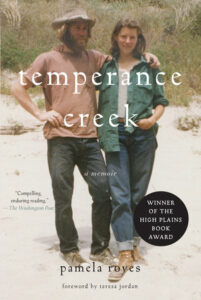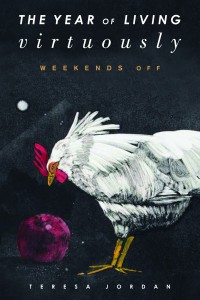Teresa Jordan
Teresa Jordan is an artist and author who grew up in a house full of books on an isolated ranch in Wyoming where the love of learning she acquired in the local one–room school carried her to Yale and into a lifetime of inquiry. Her books include the memoir Riding the White Horse Home and two illustrated journals, Field Notes from Yosemite: Apprentice to Place, and Field Notes from the Grand Canyon: Raging River, Quiet Mind. Her first book, Cowgirls: Women of the American West, was one of the earliest books to give voice to contemporary women working on the land. With her husband, Hal Cannon, she created the series "The Open Road" about the outback American West for public radio's "The Savvy Traveler." She now lives in southern Utah near Zion National Park.
Books
Temperance Creek
A Memoir
In the early seventies, some of us were shot like stars from our parents' homes. This was an act of nature, bigger than ourselves. In the austere beauty and natural reality of Hell's Canyon of Eastern Oregon, one hundred miles from pavement, Pam, unable to identify with her parent's world and looking for deeper pathways has a chance encounter with returning Vietnam warrior Skip Royes. Skip, looking for a bridge from survival back to connection, introduces Pam to the vanishing culture of the wandering shepherd and together they embark on a four–year sojourn into the wilderness. From the back of a horse, Pam leads her packstring of readers from overlook to water crossing, down trails two thousand years old, and from the vantages she chooses for us, we feel the edges of our own experiences. It is a memoir of falling in love with a place and a man and the price extracted for that love.Written with deep lyricism, Temperance Creek is a work of haunting beauty, fresh and irreverent and rooted in the grit and pleasure of daily life. This is Pam's story, but the courage and truth in the telling is part of our human experience. Seen through a slower more primary mirror, one not so crowded with objectivity, Pam's memoir, is a kind of home–coming, a family reunion for shooting stars.
The Year of Living Virtuously
Weekends Off
Benjamin Franklin was in his early twenties when he embarked on a "bold and arduous project of arriving at moral perfection," intending to master the virtues of temperance, silence, order, resolution, frugality, industry, sincerity, justice, moderation, cleanliness, tranquility, chastity, and humility. He soon gave up on perfection but continued to believe that these virtues, coupled with a generous heart and a bemused acceptance of human frailty, laid the foundation for not only a good life but also a workable society.Writer and visual artist Teresa Jordan wondered if Franklin's perhaps antiquated notions of virtue might offer guidance to a nation increasingly divided by angry righteousness. She decided to try to live his list for a year, focusing on each virtue for a week at a time and taking weekends off to attend to the seven deadly sins.
The journal she kept became this collection of beautifully illustrated essays, weaving personal anecdotes with the views of theologians, philosophers, ethicists, evolutionary biologists, and a whole range of scholars and scientists within the emerging field of consciousness studies.
Teresa Jordan offers a wry and intimate journey into a year in midlife devoted to the challenge of trying to live authentically.

Catapult | Counterpoint | Soft Skull
1140 Broadway #706
New York, NY 10001
646.926.0805 | info@counterpointpress.com






